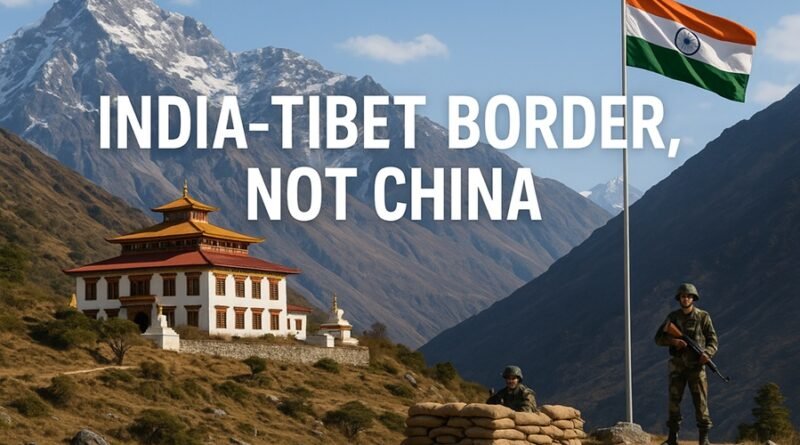India Shares Border with Tibet, Not China: Arunachal CM Pema Khandu’s Bold Statement Goes Viral
Introduction
In a bold and widely discussed statement, Arunachal Pradesh Chief Minister Pema Khandu declared that “India shares its border with Tibet, not China.” The remark has since gone viral on social media and news platforms, stirring political, diplomatic, and historical debates in India and abroad. This comment comes amidst rising tensions and regular border disputes between India and China, especially along the Line of Actual Control (LAC).
Let’s explore the context, implications, and the deeper historical significance behind this powerful statement.
The Viral Statement: When and Where
Pema Khandu made this statement during a public address near the India-China (or as he emphasized, India-Tibet) border. In his speech, he said:
“We don’t share a border with China, we share a border with Tibet.”
This remark was not a slip of the tongue but a deliberate reiteration of what many in the Indian strategic and cultural community have long believed — Tibet, not China, is India’s true traditional neighbor.
Historical Context: Was Tibet an Independent Country?
Before being annexed by China in 1950, Tibet functioned as an independent Buddhist theocracy. It maintained distinct cultural, religious, and political institutions. India, under British rule, had official diplomatic treaties with Tibet and established trade routes through places like Tawang and Nathu La.
Key historical facts:
- The 1914 Simla Convention between British India, Tibet, and China aimed to define the borders.
- China did not accept the McMahon Line, which still forms the basis of India’s border claims in Arunachal Pradesh.
- Tibet had its own flag, currency, army, and government before 1950.
Thus, Khandu’s statement resonates with historical evidence that India traditionally bordered Tibet, not the People’s Republic of China.
Political Significance
The Arunachal CM’s statement is politically charged and reflects a growing nationalist sentiment in India. It aligns with several broader narratives:
- Rejection of China’s territorial aggression and its claim over Arunachal Pradesh, which Beijing refers to as “South Tibet.”
- Support for the Tibetan cause, which includes the Tibetan Government-in-Exile based in Dharamshala and the global movement for Tibetan autonomy or independence.
- Strengthening India’s internal claim over Arunachal Pradesh as an inseparable part of the nation.
China’s Reactions to Similar Statements in the Past
Whenever Indian leaders refer to Tibet instead of China, Beijing issues strong diplomatic protests. China:
- Considers Tibet an “internal matter” and views foreign references to Tibet’s independence as interference in its sovereignty.
- Routinely objects to Indian leaders visiting Arunachal Pradesh, including Prime Ministers and Presidents.
- Has even issued “stapled visas” to residents of Arunachal, asserting its claim over the region.
It remains to be seen whether China will respond to Khandu’s statement, though the viral nature of the remark may compel an official protest.
Strategic & Security Implications
India has been fortifying its northeastern frontier, especially after the 2020 Galwan clashes in Ladakh. The statement by Arunachal’s CM aligns with India’s broader strategic moves:
- Increased infrastructure in border villages, including roads, airstrips, and helipads.
- Tactical military deployments to deter Chinese incursions.
- Cultural initiatives like building monasteries, Indo-Tibetan heritage centers, and promoting the Dalai Lama’s visits to the region.
Public and Social Media Response
Khandu’s statement quickly went viral on X (formerly Twitter), YouTube Shorts, and Instagram Reels. Netizens applauded the CM for his courage and historical clarity.
Sample reactions:
- “Thank you @PemaKhanduBJP for saying what needed to be said!”
- “We always had a border with Tibet. China came later by force.”
- “This is how India must define its diplomacy – truth-based and fearless.”
Some social media handles even started trending hashtags like #TibetIsNotChina, #ArunachalIsIndia, and #IndiaTibetBorder.
Implications for India-Tibet Relations
India has officially recognized Tibet as part of China since the 1950s, but continues to host the 14th Dalai Lama and the Central Tibetan Administration (CTA). Khandu’s statement:
- May reignite interest in the Tibet issue globally.
- Could open diplomatic channels for India to take a stronger cultural stance on Tibet, even without officially revoking past treaties.
- Reaffirms India’s moral and cultural alignment with Tibetan Buddhism, especially in regions like Arunachal Pradesh and Sikkim.
Conclusion: A Statement Rooted in History and National Pride
Pema Khandu’s declaration — “India shares a border with Tibet, not China” — is not just political rhetoric; it reflects a long-suppressed historical truth and challenges modern geopolitical narratives shaped by force and occupation.
At a time when China frequently claims Arunachal Pradesh as its own, such statements from a democratically elected Indian leader reassert India’s sovereignty, cultural confidence, and historical memory.

